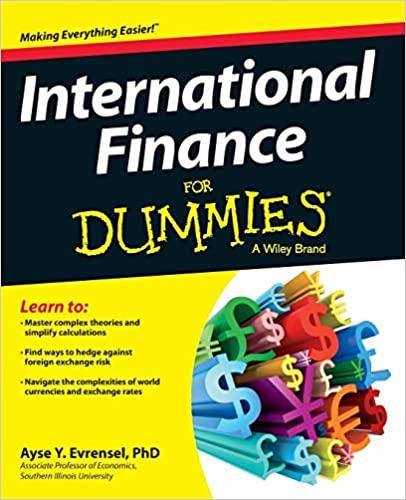Question
QUESTION 10 Thomas received a lump sum distribution of 10,000 shares of stock from his employer's stock bonus plan valued at $1,000,000 when he separated
QUESTION 10
Thomas received a lump sum distribution of 10,000 shares of stock from his employer's stock bonus plan valued at $1,000,000 when he separated from his employer at age 60. The value of the stock at the time of contribution to the plan was $250,000. What are the tax consequences of this distribution?
$750,000 is treated as net unrealized appreciation (NUA).
The NUA amount is not taxed upon distribution from the plan.
Thomas's adjusted basis in the shares is $250,000.
The $250,000 is taxable as ordinary income in the year of the lump sum distribution.
| A. | I, II, and III | |
| B. | I, II, III, and IV | |
| C. | I and II | |
| D. | III and IV |
QUESTION 11
A client, age 60, is electing to take early retirement this year. She participates in a profit-sharing plan sponsored by her employer that will provide her with a lump-sum distribution. She has been a participant in the plan for the past 12 years and has always invested her account 100% in stock mutual funds. If the distribution is made in a lump sum this year, what is an available option for the client?
| A. | Elect to treat a portion of the distribution as long-term capital gain income. | |
| B. | Execute the lump-sum distribution as a tax-free loan and repay the loan over a 5-year period. | |
| C. | Roll over the lump-sum distribution to an IRA. | |
| D. | Because 100% of her account is invested in equities, she may make a net unrealized appreciation (NUA) election and receive favorable tax treatment for the distribution. |
QUESTION 12
Which of the following is NOT an option unique to a surviving spouse when someone dies with a retirement account or IRA?
| A. | Only surviving spouses can recalculate their life expectancy each year. | |
| B. | Only surviving spouses can extend RMDs longer than ten years. | |
| C. | Only surviving spouses can absorb the money into their own name and treat the money as if the decedent never existed. | |
| D. | When the decedent dies prior to the required beginning date, only a surviving spouse can delay RMDs until the decedent would have been 72. |
Step by Step Solution
There are 3 Steps involved in it
Step: 1

Get Instant Access to Expert-Tailored Solutions
See step-by-step solutions with expert insights and AI powered tools for academic success
Step: 2

Step: 3

Ace Your Homework with AI
Get the answers you need in no time with our AI-driven, step-by-step assistance
Get Started


